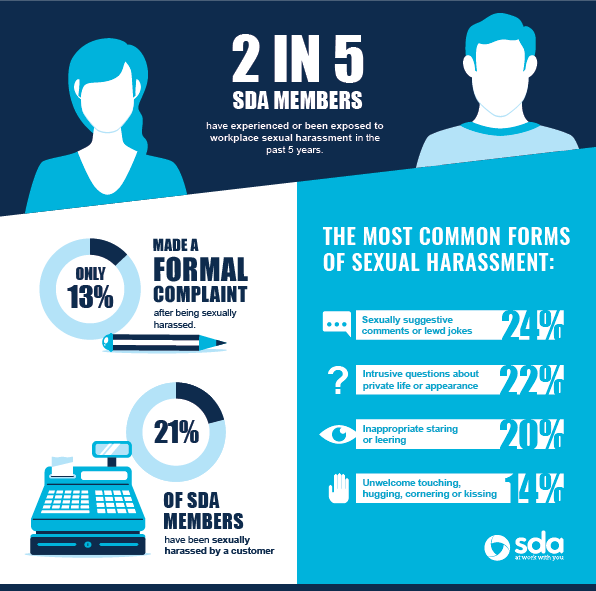Sexual Harassment: Not Ok. Not Ever.
By Chris Gazenbeek, SDA State Secretary
The SDA and the Australian Human Rights Commission conducted a National Workplace Sexual Harassment Survey of SDA members between March and April 2019. Over 3400 retail, warehouse and fast food members participated in the national Survey.
The purpose of the Survey was to investigate the prevalence, nature and reporting of sexual harassment of SDA members in their workplaces and in the community more broadly.
The 2019 Member Survey was conducted online and examined:
- the prevalence and nature of sexual harassment experienced by SDA members aged 15 years and older across their lifetime (at any time or anywhere) and in the workplace, with a particular focus on workplace sexual harassment committed by customers;
- the characteristics of harassers of workplace sexual harassment;
- the characteristics of workplaces where sexual harassment occurs;
- the reporting of workplace sexual harassment and the outcomes of complaints;
- the impacts of workplace sexual harassment on those who experience it;
- the responses of people who witnessed or heard about sexual harassment in their workplaces;
- the prevalence and implementation of workplace training on sexual harassment;
- the prevalence and awareness of workplace sexual harassment policies and procedures;
- SDA members’ awareness of where they can access information about sexual harassment.
What is sexual harassment?
Sexual harassment is any unwanted or unwelcome behaviour of a sexual nature that a reasonable person would anticipate would make a person feel offended, humiliated or intimidated. Whether or not it is intended or unintended, sexual harassment can be perpetrated by anyone in the workplace including co-workers, customers, visitors or managers.
Positive action:
The SDA strongly believes that there are two key actions which we believe can help put an end to sexual harassment:
- Prevention: currently there is no requirement for employers to proactively prevent sexual harassment towards their employees. Employers must put in place prevention strategies to stop harassment occurring in the first place.
- Reporting: employers must make reporting sexual harassment easier for their employees and take appropriate action when incidents are reported so victims can feel safe and confident that they will be taken seriously.
What should you do if you experience sexual harassment?
- Make a detailed report of what happened;
- Report the incident to your employer and to the SDA;
- Under the law, you are protected from being victimised or losing your job if you make a complaint of sexual harassment, or if you act as a witness for a co-worker who is making a complaint;
- If the behaviour persists and/or is of a criminal nature, you should contact the SDA immediately.
Finally, I’d like to thank the 775 SDA Queensland members who participated in this important survey. You have played a major part in helping eliminate sexual harassment from our workplaces.

